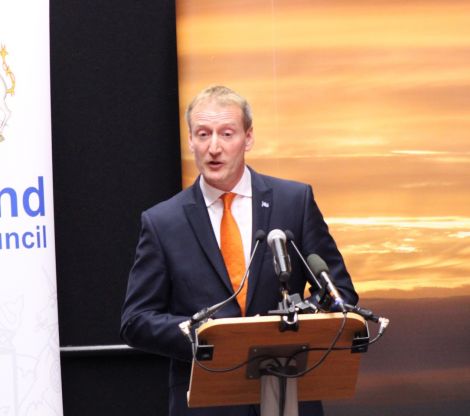News / Scott criticises SNP plans to cut tax on air passengers
SHETLAND MSP Tavish Scott has criticised the Scottish Government’s plans to halve Air Passenger Duty – but supports reducing aviation tax levied on internal Scottish flights.
His comments follow the news that a bill to replace Air Passenger Duty with Air Departure Tax (ADT) was passed in the Scottish Parliament on Tuesday. The Scottish Government’s plan is to reduce the levy by 50 per cent, with a view towards scrapping it entirely.
Scott wants to see only flights within Scotland be subject to any reduction in tax, which would result in a lower overall travel fare for islanders. But he opposes the wider proposals, which have also been criticised by the Scottish Greens and environmental groups.
The MSP said: “On the broader policy this will cost £150 million, there is little of no financial or environmental impact assessment and I don’t think it’s a good use of taxpayer’s money when we see the financial needs of local schools, the health service or for instance ferry fares.
“In addition as you will have seen all Scotland’s airports publish traffic figures which show the air travel is rising not falling. Why then does the taxpayer have to help the airline business and profitable airports?”
The SNP claims the proposals will improve Scotland’s international business networks as well as tourism.
Finance secretary Derek Mackay said: “The Scottish Government’s plans for ADT are a key part of our economic strategy for sustainable growth – in particular boosting trade, investment, influence and networks.”
He added: “Scotland is already an attractive destination for business and inbound tourism, but it is important, particularly given the economic threat posed by Brexit, that we continue to be open to key and emerging markets in order to further capitalise on the opportunities that exist.”
Become a member of Shetland News
But there have been concerns that the proposals would mainly benefit wealthier people who use air travel more often, as well as environmental concerns over increased emissions as a result of the policy.
Further details, including tax bands and tax rate amounts, are to be published in the autumn. The government has also pledged to publish an independent economic assessment of its plans.
The bill is an example of Scotland’s newly devolved fiscal powers over taxation, which originated from the Smith Commission report following the independence referendum in 2014.
Patrick Mainland
Become a member of Shetland News
Shetland News is asking its many readers to consider paying for membership to get additional features and services: -
- Remove non-local ads;
- Bookmark posts to read later;
- Exclusive curated weekly newsletter;
- Hide membership messages;
- Comments open for discussion.
If you appreciate what we do and feel strongly about impartial local journalism, then please become a member of Shetland News by either making a single payment, or setting up a monthly, quarterly or yearly subscription.




























































